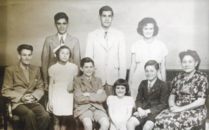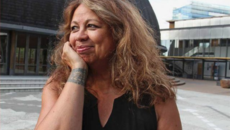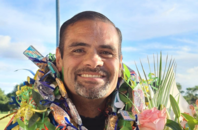Dr Lesieli Tongati’o: This is who I am, going far and wide in education
I was born in Kolomotu’a, Tongatapu, Tonga, the eldest daughter of Mele Fe’ofa’aki Tapealava and Viliami Vea ‘o Lotoneiafu Pelesikoti (Prescott).
With two younger brothers ‘Ikani and Kolopeaua and a sister Netatua, our parents also ohi (adopted) a nephew and two nieces. We all lived together with our paternal grandparents, plus any other family that came to the main island of Tongatapu for further education or work opportunities. Our household was very vibrant, busy and welcoming of all family, friends and anyone needing any kind of support.

Our parents always told us about the significance of our birth right and birth places and made sure that we knew our ancestors, their prowess and skill in fishing, weaving, farming, carpentry, as Christians and scholars. We were taught what our positions in the family were, what being an eldest daughter meant, and what my brothers and sister’s roles were in relation to me and our immediate and extended family. I was brought up to be a role model and do well in education so the younger ones can follow. I was also to love them all unconditionally and be there for everyone whenever needed. Our brothers were to make sure their sisters and their families were well looked after and that the extended family was well connected through all key family events. Best of all, our father said that I can make the final decisions about the things that we kids, must do and provide for family events because I am the oldest. I really love being the boss!
Our parents taught us that church was first priority, our education top priority and family, number one priority! There were and still are, numerous priorities. They brought us up to value the importance of fefaka’apa’apa’aki (mutual respect), tauhi hoto vaha’a ngatae (looking after our spatial relationships with others), tauhi vaha’a (loyalty and commitment), mata‘ofa (love), mamahi’i me’a (being passionate and standing strong), lototō (humility and generosity) and feveitokai’aki (sharing, cooperating and fulfilling mutual obligations). These strong foundations were the POU that supported us to be strong leaders, organisers, influencers and to make a difference in whatever we do.
Our mother taught us to multitask and be multiskilled like her. She was a primary school teacher and principal and our house was always full of final year primary students coming to her for extra support to prepare for the secondary school entrance exams.
Mum was also a weaver, tailor and ngatu (tapa cloth) maker, able to operate successfully in family functions and national events. She taught us the importance of family occasions where we are mā’olunga (of high status) especially on her side of the family, and when we are mā’ulalo (of low status) on our father’s side of the family, and, the appropriate gifts and behaviour expected, and, to always be mata ‘ofa.
An example of mum’s work is this delicate Kato Mosikaka, made of coconut sinnet woven together. This traditional basket, rarely woven these days, is an heirloom in our family.
KATO MOSIKAKA

I loved my education and my teachers at primary and high school believed in my dreams and in my abilities and inspired me to push myself further. I attended Kolomotu’a Government Primary School (GPS) for Classes 1 and 2, then left to attend Nuku’alofa Government Primary School when my mother moved from teaching at Kolomotu’a GPS to Nuku’alofa GPS. From there I went to Tonga High School whose motto is Ki he Lelei Taha – To The Best. This instilled in me the importance of being unafraid and always striving for the best in whatever one does.
I acknowledge my parents for bringing us up to be strong in who we are, know our immediate and wider families, and, our roles and responsibilities. They brought us up to always operate with a wider view of things as well as knowing how to operate across multiple social-cultural contexts. To dream big, follow through and make a difference wherever we are, and to back each other to win. They wanted us to do well in education in Tonga so that we can win scholarships for further education overseas because they couldn’t afford this. We were not rich moneywise, but we were rich culturally and familywise.
I succeeded and left Tonga for further education in Aotearoa NZ, my brothers to Australia and NZ, my sister to Fiji, the Netherlands and Australia, all as scholarship recipients. We feel really blessed to have had an amazing journey in education, my brother ‘Ikani was the first Tongan to gain a surveyors degree, my yonger brother Kolopeaua is a CT Application Specialist and my late sister Netatua was an environmental scientist, specialising in climate change. My siblings and I have worked for the Government of Tonga, across the Pacific region and internationally.

I always wanted to make the most of the opportunities in my educational journeys. For me, education was never a choice about being successful at the cost of my being Tongan, my identity, language, and culture. I am a proud Tongan woman, that is who I am, a wife, mother, grandmother, academic, professional learning and development facilitator, working with Pacific communities to understand the education system, and, with education leaders, teachers and educators to be more culturally responsive so that Pacific learners can achieve the best education outcomes. I am unafraid to bring a strong Pacific voice to be heard wherever it is needed, alongside acknowledging my cultural heritage and values.
In 1971, I attended Form 7 at New Plymouth Girls High School and spend a year boarding at Scotlands hostel. Having left a co-educational high school and arriving at a girls only high school was very different for me. When I came here, I thought I spoke good English because we all had to speak English at Tonga High School and most of our teachers were non-Tongan. However, I found that the spoken English language was completely different to what I learned in Tonga, which was focused on being grammatically and structurally correct. It was great to spend a year learning to know more about people, the environment, food, clothes, language, behaviour and routines, as everything was very different and new to me. I had to relearn spoken English, but my writing, reading and comprehension were fine.
From there I came to Massey University and Palmerston North Teachers College. After four years in Palmerston North I went back to Tonga and taught mathematics and science at Tonga Teachers College from 1976-1979, becoming the HOD Science. Most of the students at that time were older than me as there was a practice of secondary students becoming untrained teachers before there were opportunities for them to attend teachers college.
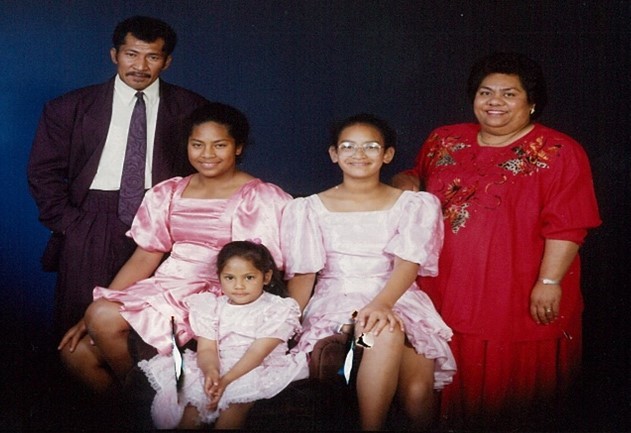
Tonga Teachers College was a great opportunity to connect what I’d learned in Aotearoa New Zealand to teaching and learning in Tonga. When I first went into the science laboratory there was one bunsen burner and a packet of litmus paper. I believe this gave me the resolve to be creative, not letting the sparse resources hinder learning and teaching. This meant that the environment and the surrounding contexts became significant learning opportunities with resources that were accessible and important for being Tongan. I was also asked to write the science curriculum and I appreciated the opportunity to make connections to whatever science curriculum was available in primary and secondary levels. Working at the teachers college also encouraged me to deepen my knowledge in education, learning and teaching.
My family and I then decided to came back to Massey University so I can study education. While there I was fortunate to be invited to be a tutor in education alongside lecturing in an Education and Society paper while completing my master’s degree. After graduating with an M.Ed I became a relief teacher in a number of high schools in Palmerston North before teaching for two years at Queen Elizabeth College. I was always invited to teach a range of subjects from Social Studies, Geography, English for Speakers of Other Languages (ESOL), Mathematics, Pacific Studies and Religious Education. I was happy to take on any activity/subject alongside mentoring and supporting students.

I then became a business owner of a Private Training Establishment (PTE), Kitefakalau Training Centre. To me, this was a way of getting back into leadership and management furthering the experiences I’d gained in Tonga. This PTE was the only Pacific one in this region and participants went on to gain further tertiary qualifications. I also did consultancy work across the Pacific region including reviewing vocational education and training in Fiji. I then became the Academic Director of a Pacific Senior Management Development Programme at Victoria University, Wellington. This was to support Pacific people into senior management roles within the public service, as in those days there were few Pacific people in these roles. This was the beginning of my commuting to Wellington for work and I acknowledge the great support from my family during these years. I always made sure that I attended all our daughters’ parents teacher interviews and school productions. They always looked happy when they see me coming into the school hall.
From there I went into the Ministry of Education as Pule Ma’ata Pasifika, I wanted to see how the education policy world was working for Pacific peoples. The activities that existed at the time included the Pacific Islands Polynesian Education Foundation (PIPEF) scholarships, established in 1972, renamed in 2016 as the Pacific Education Foundation. There was also support for Pasifika early childhood education services delivered through the Early Childhood Development Unit, the Crown Agency responsible for early childhood operational activities at the time. This included support for Pasifika playgroups and resource production, and in 1994, work began on developing Pasifika language curriculum starting with the Samoan language curriculum.

Being in the Ministry was an opportunity to influence Pasifika education policy and strategic directions. I believed it was important to build and sustain reciprocal relationships with Pasifika communities to hear their voices about their education experiences. Alongside this was building and sustaining reciprocal relationships across the Ministry to create better understanding towards creating transformative change, valuing Pasifika success.
This led to the first fono series starting in 1994, enabling Ministry Management and I to hear directly from Pasifika communities, Pasifika and non-Pasifika educators and teachers, students and education providers across the country. A Pasifika reference group was set up in 1996, which become the Pasifika Advisory Group. This become a trusted voice for advice across the Ministry and was consulted on numerous policies and operational activities. It provided a key bridge between the Ministry and Pasifika communities across the country through talanoa, consultation and providing feedback, discussing Pasifika education issues with the Ministry and helping to identify priorities for national, regional or local offices to address, and, taking information out to communities as well as bringing community voices back. Membership spanned across all Pasifika communities, education sectors with education agencies always present to hear all the talanoa.
From these talanoa I was committed to planning a Pasifika way forward strategically and operationally. Drawing these journeys together is shown through the Fanā Fotu – Transformation methodology below.
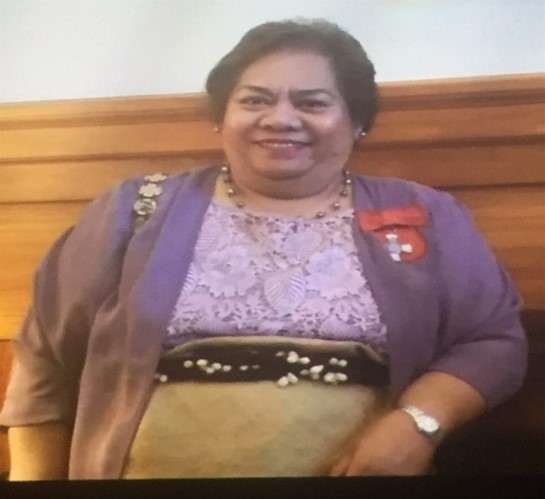
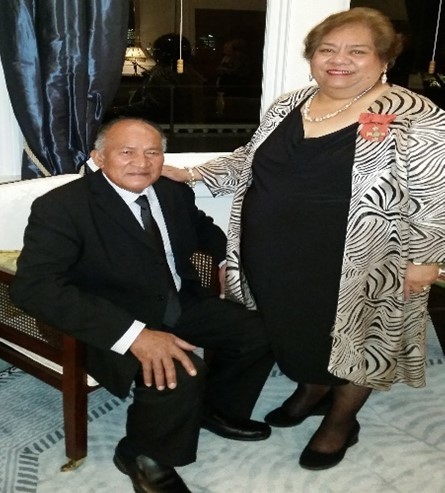
FANĀ FOTU - TRANSFORMATION
The Fanā Fotu – Transformation (Fanā Fotu) methodology brings together all the Pasifika voices, data, research and evidence to co-construct ways forward towards developing Pasifika strategic plans.
Fanā Fotu operates on the “balcony”, as well as on the “dancefloor” (Heifetz and Linsky, 2002), with talanoa ako at the centre, sustaining strong tauhi vā relationships, important between individuals, and within and between systems and different generations as they negotiate themselves across intercultural realities and multiple world views (Tongati’o, 2010). Fanā Fotu brings together Pasifika and non-Pasifika methodologies for working across the Ministry, other education agencies, Pacific communities’ voices, research and data of what works to raise achievement, and, Pasifika knowledges and ways of knowing to co-construct culturally appropriate practices, creating value for all.
Fanā Fotu provides a way of working and knowledge building that weaves together Pasifika and non-Pasifika methodologies from which to develop responsive leadership and pedagogical practices for Pasifika success.


